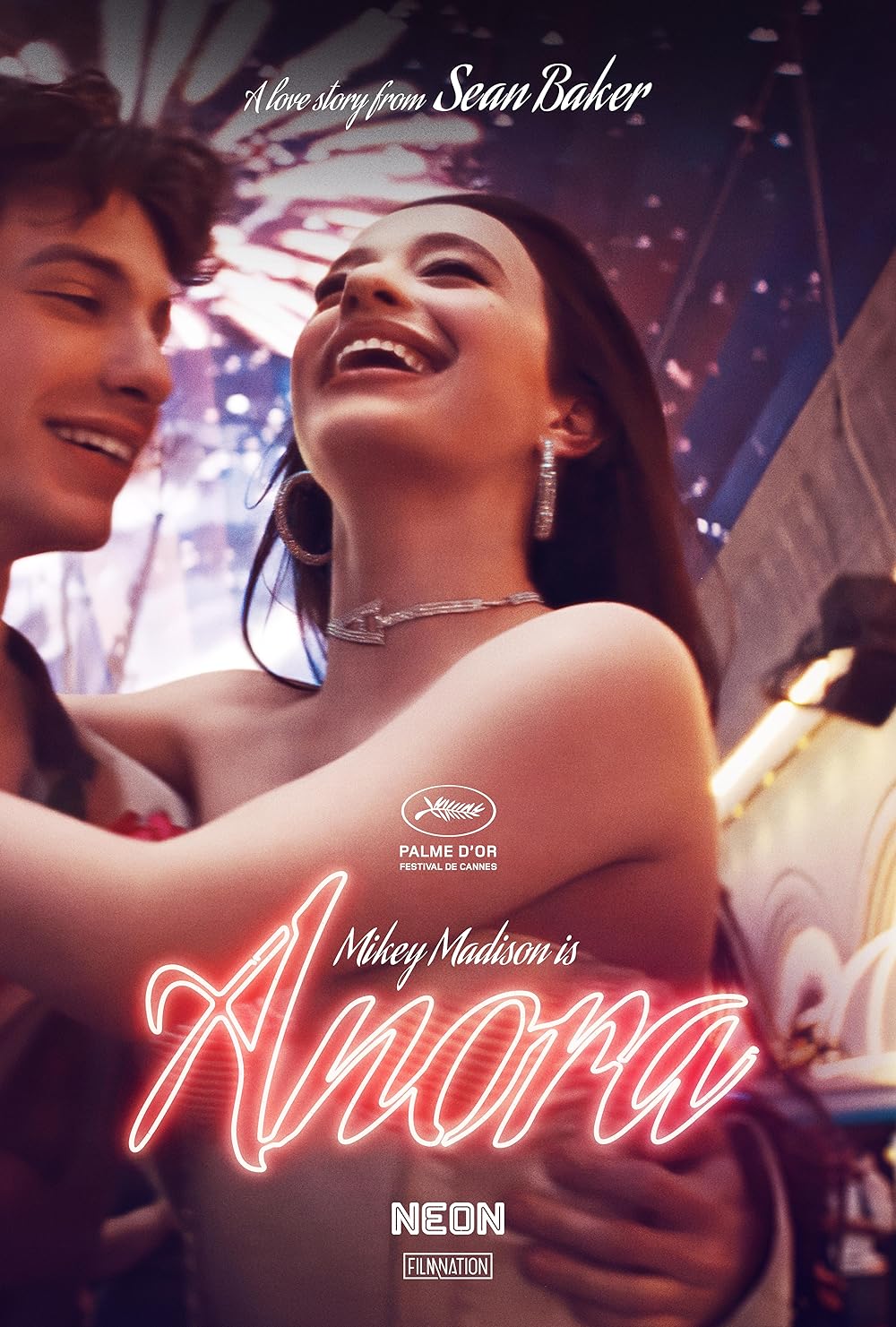On a snap decision over carton egg omelettes at brunch, I bought tickets to see Anora at the AMC in West Harlem at 9pm on a Friday night. The winner of the much-coveted Palm D’or, the film details the exotic dancers Ani’s (Mikey Madison), whirlwind engagement to the awkward but opulently wealthy son of Russian oligarch, Vanya (Mark Eydelshteyn). The backdrop is wintery Brooklyn, and the soundtrack is early 2000s British club bangers. The absurdism continues.
My brief encounters with the advertising for the movie grievously misguided me. Delirious neon titles label snapshot images of an ever-beautiful Madison embracing an unseen male figure with glee. With taglines like “love is a hustle,” I assumed the film would be yet another Americana rom-com veiled by the supposed artistry of gratuitous swearing and the occasional tasteful pole-dancing scene. And, sure, the movie is not short of casually dropped “fucks” and half-dressed sequences, as well as a 90-minute opening of exhilarating young romance, but nonetheless, somehow, director Sean Baker has produced something different. I’m still trying to figure out where that difference lies.
The cinematography reminded me of British film maker Andrea Arnold, with her social-realist films American Honey and Fish Tank detailing the turbulent realities of marginalized young women attempting to escape their circumstances. In an NPR interview, Baker reveals his process of a six month break between filming and editing to piece together the footage as an objective ‘documentarian.’ Certainly, his camera treats the star with an absence of moral judgement typical of social realism, a lens distinct from any narrative depiction of sex work I’d seen before.
This is not to say the film overlooks the downfalls of exotic dancing. Ani mentions her lack of healthcare benefits and a colleague discusses a client who likened her to his teenage daughter with a shudder. Yet, Ani remains confident and even empowered in her work. Her employers and (most) of her fellow dancers are amicable. There is no villainous manipulation from the higher-ups as seen in Netflix’s “Beauty In Black,” placing culpability for the abuse of sex workers onto female supervisors rather than systemic faults. Like all jobs, it has its hardships and its perks.
Anora dips into intense surrealism and contrived comedy, destabilizing the documentarian technical elements. The opening of the film is an irreverent assault on the senses. Exotic dancers give men seated inches from each other lap dances in slow motion, serenaded by Take That’s Greatest Day, a song which becomes an established motif by the end of the film. The music could reasonably be playing in the club, but it is expanded and echoed, becoming non-diegetic. And thus, a subtle balance of realism and surrealism is established in the first minute of the film. Perhaps therein lies Sean Baker’s magic touch.
My principal gripe with the film was the inaccessibility of Ani’s past. An avid consumer of bildungsroman media, I wanted a fleshed-out childhood of our lead. Where did this hard-headed, admirable confidence come from? Did certain events lead her to work at the club? But Baker’s refusal to dip into an imagined past resists Ani’s characterization of spokesperson for the pipeline between childhood trauma and sex-work. The trope of the turbulent adolescent turned exotic dancer is problematic and overwrought. It is also very easily slipped into, as evidenced by my own questions. In a New York Times interview, Michael Frank describes Ani as “brash, broken, happy only for a fleeting moment.” This pigeonholing word ‘broken’ I believe is exactly what Baker refused.
The conspicuous question throughout the film is who is in control? Madison’s performance is kinetic, her confidence embodied. Vanya, on the other hand, is physically immature, his limbs unyieldingly long for his body. During sex scenes, she both initiates and guides him. Physically, Madison appears to be in control. The conventional power dynamics of a transactional relationship between a paying man and a serving woman are disturbed.
The middle of the film consists of Ani physically resisting sidekicks sent by Vanya’s family to annul the marriage. It is a scene painstakingly aware of gendered power dynamics. Ani kicks and punches and screams, the camera honing in on her agape mouth struggling against a scarlet gag. But it’s supposed to be funny? The populace of the cinema, including myself, is giggling as she breaks the nose of a man twice her height. As she’s tied up, face down on the couch, in her pyjama top and tiny shorts, still writhing and fighting, are we meant to question our laughter? It’s not clear and that’s where Baker’s lost me. As the scene verges on twenty minutes, it feels like slapstick and lacks the nuance of the rest of the film.
Just when the film is losing me, I am revived by a striking last scene. No longer wife to Vanya, no longer wealthy by proxy, Ani inexplicably initiates sex with one of Vanya’s family stooges. When he tries to kiss her, she pulls away and descends into tears rather than anger for the first time. Her body, which has been the physical, sexual, focus of power in the film, collapses inwards into the body of one of the men who has both restricted her and shown her kindness. There is an abrupt revelation of vulnerability, usurping Ani from her pedestal of fiery powerhouse.
It dawns on us, although this has been a spectacle for the viewer, the subject of our gaze has experienced undeniable trauma. We watched a young woman being tied up, gagged, and forced to annul a marriage which dangled hope for economic security tantalizingly in front of her. We sat giggling and appreciating the stylistic merits of the scene. Contrasting the opening burst of music, the credits roll in silence aside from the muffled stalling of the engine and the pervasive question of who really possesses the power? The viewer must sit with their thoughts and mentally categorize them into coherent sentences in anticipation of the inevitable sidewalk debrief.
– Ruth Ginsburg Hix

